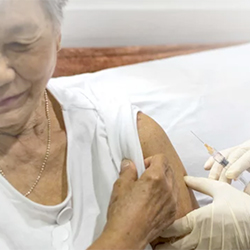By Landon Gray
On June 30, the FDA recommended the addition of an omicron BA.4/5 component in COVID-19 vaccine booster doses.
With unanimous consent, the Vaccines and Related Biological Products Advisory Committee voted to include a SARS-CoV-2 omicron component to bolster immune protection against the subvariants in the United States.

The agency said it is critical that the United States has safe and effective vaccine boosters that provide protection against circulating and emerging variants to prevent the most severe consequences of COVID-19 as the fall and winter seasons approach. The FDA hopes the new booster doses will be available in the fall.
Regulators at the FDA have already advised vaccine manufactures to develop a bivalent vaccine from the current existing vaccine composition that adds an omicron BA.4/5 spike protein component.
Pfizer-BioNTech, which makes the messenger RNA (mRNA) vaccine, Comirnaty, announced promising results from ongoing trials designed to evaluate the safety, tolerability and immunogenicity of modified COVID-19 vaccine candidates—one monovalent and one bivalent—that include a spike protein of the omicron BA.1. Data from a phase 2/3 trial showed that a booster dose from both vaccine candidates generated a significantly greater immune response against omicron BA.1 compared with the companies’ current COVID-19 vaccine in adults 56 years of age and older.
The previously specified standard for superiority was measured by the ratio of neutralizing geometric mean titers (GMRs) for the 30- and 60-mcg doses, with the lower bound of the 95% CI higher than 1.
Compared with the current COVID-19 vaccine, the GMRs for the monovalent 30- and 60-mcg vaccines were 2.23 (95% CI, 1.65-3.00) and 3.15 (95% CI, 2.38-4.16), respectively. The documented GMRs for the bivalent 30- and 60-mcg vaccines compared with the current COVID-19 vaccine were 1.56 (95% CI, 1.17-2.08) and 1.97 (95% CI, 1.45-2.68), respectively.
The monovalent omicron-adapted vaccine achieved a lower bound 95% CI for GMR of more than 1.5, which met the regulatory requirement of super superiority.
As more data are collected, vaccine manufactures are advised to submit data related to clinical trial results of modified vaccines containing an omicron BA.1 component to the FDA before the evaluation and possible authorization of any modified vaccine.
In anticipation of the transitional period when the modified vaccine booster may be introduced, the FDA recommended vaccine manufacturers not to change or modify the primary vaccination vaccine. Since base protection against severe outcomes from COVID-19 is provided by the primary vaccination series, no change was recommended.
The FDA will continue to communicate future plans regarding potential authorization or approval of COVID-19 vaccine booster doses that include an omicron component.




